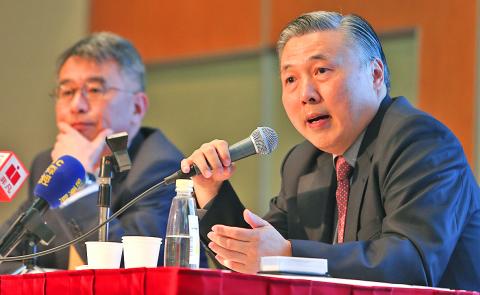Advanced Semiconductor Engineering (ASE, 日月光), the world’s largest chip packager and tester, yesterday said its revenue growth momentum would likely be restrained this quarter.
“At best, the situation in the first half can be described as an environment filled with mixed messages,” ASE chief operating officer Tien Wu (吳田玉) said, citing a downturn in the PC industry and tight inventory controls in the semiconductor supply chain.
The company’s third-quarter guidance foresees flat or limited growth of between 1 percent and 5 percent at its core integrated circuit assembly, test and material (IC ATM) business, but it expects gross margin to remain relatively unchanged from the first quarter.

Photo: CNA
This quarter, the company’s electronic manufacturing service (EMS) unit should see revenue grow by between 7 and 8 percent from the previous quarter to approach the levels seen in the fourth quarter last year, but the unit’s gross margin would likely decline slightly, the company told a press conference.
In the second half, ASE is expecting sequential revenue growth in both the IC ATM and EMS businesses, the company said.
It is also hoping to build momentum on its existing and upcoming new system-in-package (SiP) projects, such as 2.5D flip-chip IC solutions that promise 20 times the maximum input/output counts compared with the available alternatives.
ASE also said that it hopes to bolster its SiP paradigm and toolbox platforms to promote integration of heterogeneous components and functionalities in the most efficient form, as well as greater collaboration between global partners in the vertical supply chain.
“We are cautiously optimistic about sales prospects in the second half, despite low visibility,” Wu said.
Gross margin for the packaging business in the second quarter declined slightly to 22.7 percent from 23.7 percent, while the figure for its testing operations rose to 35.2 percent from 34.3 percent, materials operations declined from 17.1 percent to 16.2 percent and electronic manufacturing service declined from 8 percent to 6.4 percent.
“In the first half, we have seen more aggressive inventory adjustments by our clients, but such measures usually last no more than two quarters,” Wu said.
ASE reported second-quarter net income of NT$3.7 billion (US$117.1 million), or earnings per share of NT$0.48, down 18 percent quarter-on-quarter and 28.5 percent from the previous year.
Nevertheless, consolidated revenue in the first half rose 19.03 percent percent year-on-year to NT$134.9 billion to hit a new record high.
In particular, the sales contribution from the advanced SiP business tripled from the previous year, boosting its contribution to total revenue from 7 percent to 15 percent, the company said.

CHIP WAR: Tariffs on Taiwanese chips would prompt companies to move their factories, but not necessarily to the US, unleashing a ‘global cross-sector tariff war’ US President Donald Trump would “shoot himself in the foot” if he follows through on his recent pledge to impose higher tariffs on Taiwanese and other foreign semiconductors entering the US, analysts said. Trump’s plans to raise tariffs on chips manufactured in Taiwan to as high as 100 percent would backfire, macroeconomist Henry Wu (吳嘉隆) said. He would “shoot himself in the foot,” Wu said on Saturday, as such economic measures would lead Taiwanese chip suppliers to pass on additional costs to their US clients and consumers, and ultimately cause another wave of inflation. Trump has claimed that Taiwan took up to

A start-up in Mexico is trying to help get a handle on one coastal city’s plastic waste problem by converting it into gasoline, diesel and other fuels. With less than 10 percent of the world’s plastics being recycled, Petgas’ idea is that rather than letting discarded plastic become waste, it can become productive again as fuel. Petgas developed a machine in the port city of Boca del Rio that uses pyrolysis, a thermodynamic process that heats plastics in the absence of oxygen, breaking it down to produce gasoline, diesel, kerosene, paraffin and coke. Petgas chief technology officer Carlos Parraguirre Diaz said that in

Japan intends to closely monitor the impact on its currency of US President Donald Trump’s new tariffs and is worried about the international fallout from the trade imposts, Japanese Minister of Finance Katsunobu Kato said. “We need to carefully see how the exchange rate and other factors will be affected and what form US monetary policy will take in the future,” Kato said yesterday in an interview with Fuji Television. Japan is very concerned about how the tariffs might impact the global economy, he added. Kato spoke as nations and firms brace for potential repercussions after Trump unleashed the first salvo of

SUPPORT: The government said it would help firms deal with supply disruptions, after Trump signed orders imposing tariffs of 25 percent on imports from Canada and Mexico The government pledged to help companies with operations in Mexico, such as iPhone assembler Hon Hai Precision Industry Co (鴻海精密), also known as Foxconn Technology Group (富士康科技集團), shift production lines and investment if needed to deal with higher US tariffs. The Ministry of Economic Affairs yesterday announced measures to help local firms cope with the US tariff increases on Canada, Mexico, China and other potential areas. The ministry said that it would establish an investment and trade service center in the US to help Taiwanese firms assess the investment environment in different US states, plan supply chain relocation strategies and